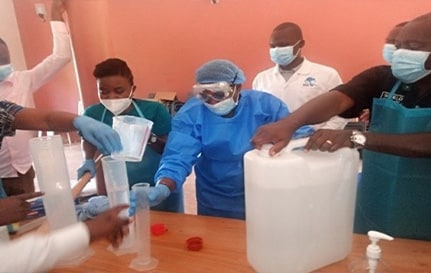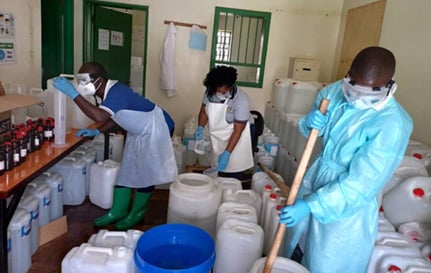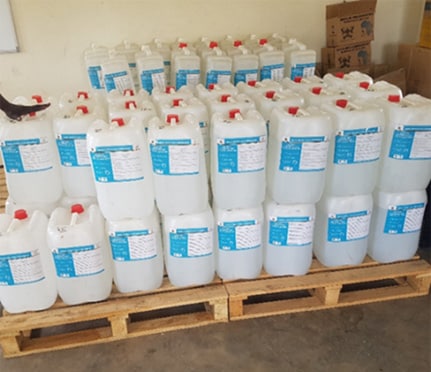At a glance
- Increasing the supply of alcohol-based hand rub (ABHR) has helped healthcare workers clean their hands more often and prevent the spread of illness.
- Since 2018, CDC has supported the Infectious Diseases Institute, a nonprofit in Uganda, open centers to produce ABHR. As a result, hospitals and healthcare workers received quick and sufficient supplies of ABHR during the Uganda's 2022 Ebola outbreak.

Introduction
On January 11, 2023, Uganda's Ministry of Health declared the end of the Ebola outbreak caused by Sudan ebolavirus (SUDV), which began on September 20, 2022. A total of 143 confirmed cases and 55 deaths were reported across nine districts – Mubende, Kyegegwa, Kassanda, Kagadi, Bunyangabu, Kampala, Wakiso, Masaka, and Jinja.
Keeping hands clean can prevent the spread of infectious diseases like Ebola, especially in healthcare settings. The availability of alcohol-based hand rub encourages healthcare workers to follow recommended hand hygiene practices and lowers the risk of infection among patients and staff.
When the Ebola outbreak was declared, three production centers quickly provided ABHR to more than 200 health facilities in the affected districts. The centers could respond because of existing programs funded by CDC's Global Health Security program and Division of Foodborne, Waterborne, and Environmental Diseases (DFWED) and supported by CDC and the Infectious Diseases Institute.
Partnering to increase production
Since 2018, DFWED's Global Water, Sanitation, and Hygiene (WASH) program and the CDC Uganda country office have collaborated with the Infectious Diseases Institute to improve access and the use of alcohol-based hand rub. Efforts to increase availability of ABHR and encourage healthcare workers and the community to clean their hands more often have included:
- Supplying raw materials to make ABHR
- Identifying and renovating a district production and storage facility
- Training and mentoring ABHR producers
- Supporting distribution and plans for restocking supplies
- Monitoring use of ABHR at healthcare facilities and key community settings
From 2018 through 2022, agreements with nine districts in Uganda were made to increase involvement and ownership of ABHR production. Those districts are Kabarole, Kasese, Amuru, Tororo, Moroto, Kotido, Adjumani, Koboko, and Kampala. A few facilities, including Kasangati Health Centre IV in the Kampala district, double as training centers and production facilities. As of 2023, the program provided ABHR and expanded access to hand hygiene resources to more than 200 healthcare facilities and over 60 community settings in Uganda.
Being prepared fuels swift response

The first cases of Sudan ebolavirus were detected at the Mubende Regional Referral Hospital in Central Uganda. A small group of five healthcare workers provided supportive care for patients in an isolation unit. Since no vaccine was available for Sudan ebolavirus, basic treatment including fluids, electrolytes, and blood pressure medication was implemented early to improve patients' chances of survival. However, providing direct care to patients also put healthcare workers at high risk. By the end of the outbreak, healthcare workers made up 13% of the confirmed cases.
To prevent Ebola from spreading to healthcare workers and the community, increased access to hand hygiene materials is crucial along with other personal protective efforts. After four years of joint preparedness efforts with CDC, the Infectious Diseases Institute rapidly mobilized resources to the affected districts at the onset of the 2022 outbreak and produced more than 16,400 liters of alcohol-based hand rub in seven days.
This rapid production resulted in enough alcohol-based hand rub to provide the necessary supply at every healthcare facility in the affected districts for up to three months. This included the Mubende Regional Referral Hospital, which currently hosts two Ebola treatment units, giving healthcare workers easy access to hand hygiene resources. In addition to providing alcohol-based hand rub, the Infectious Diseases Institute's infection prevention program also provides tips on how to use alcohol-based hand rub effectively.
Looking ahead

The demand for alcohol-based hand rub was estimated at about 19,000 liters per month for the districts affected by the outbreak, the equivalent of a quarter of a residential swimming pool. Although the prices of raw materials are likely to increase, producing ABHR has saved about $15 per gallon ($4 per liter) over the commercial purchase price.
With CDC's support, the Infectious Diseases Institute plans to scale up local production of ABHR at the national level to ensure ongoing access in Uganda's healthcare facilities and community settings like markets and schools. Along with sustaining and scaling up production and distribution of ABHR, the institute created and piloted an online training on ABHR production at the local level.
CDC and the Infectious Diseases Institute continue to find ways to encourage quick mobilization of resources, including ABHR, trained producers, and raw materials, when there is a public health emergency.
